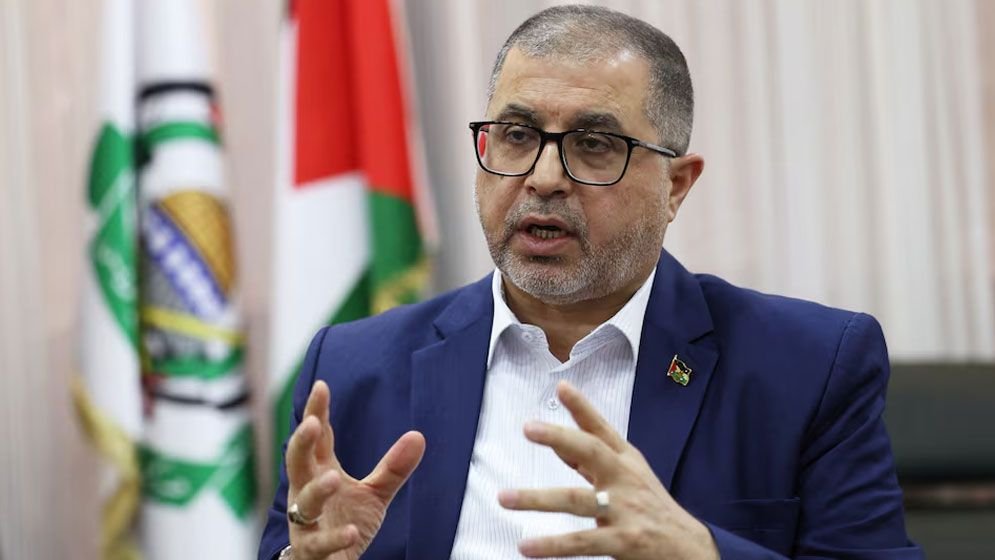Hamas Rejects Trump’s Gaza Proposal, Demands Aid Before Talks
Hamas has firmly dismissed former US President Donald Trump’s controversial proposal regarding the future of Gaza, emphasizing that the besieged territory is not a bargaining chip in political negotiations. A senior Hamas leader, Bassem Naim, formerly Gaza’s Health Minister, stated that any discussions with Israel can only begin once humanitarian aid, including food and medicine, is allowed into Gaza without restrictions.
Naim made these remarks during an interview with the Saudi media outlet Al-Hadath, where he stressed that Gaza remains an inseparable part of Palestine and cannot be treated as a commodity for sale. His comments came in response to Trump’s renewed push for his so-called “Gaza transformation plan,” which suggests relocating Palestinians and altering the territory’s status.
Trump first introduced this plan in early 2025, sparking immediate backlash from Palestinians, Arab nations, and the United Nations. Critics have warned that the proposal could lead to forced displacement, effectively amounting to ethnic cleansing. During a recent business conference in Qatar, Trump further inflamed tensions by claiming that there was “nothing left to defend” in Palestinian territories, a statement that has drawn widespread condemnation.
The Hamas leader reiterated that lifting the blockade on essential supplies is a non-negotiable condition before any political dialogue can proceed. The ongoing Israeli military offensive has exacerbated the humanitarian crisis in Gaza, where over 53,000 Palestinians have been killed since the war began in October 2023. The daily death toll continues to rise, with at least 143 Palestinians killed in a single day due to relentless airstrikes, ground assaults, and naval bombardments.
Egypt and Jordan, along with international organizations, have already rejected Trump’s suggestion of relocating Gazans to neighboring countries. The proposal has raised global concerns about the US stance on Gaza, with many viewing it as an attempt to erase Palestinian rights and sovereignty.
The situation in Gaza remains dire, with more than 120,000 people injured and countless others displaced. Hospitals are overwhelmed, and basic necessities such as food, clean water, and medical supplies are in critically short supply. Humanitarian agencies have repeatedly called for an immediate ceasefire and unrestricted access to deliver aid, but Israel’s siege continues unabated.
Hamas has made it clear that any negotiations must prioritize the well-being of Gaza’s civilian population. The group insists that the international community must hold Israel accountable for its actions and ensure that Palestinians are not subjected to further suffering. The refusal to entertain Trump’s plan underscores Hamas’s commitment to preserving Gaza as an integral part of a future Palestinian state.
As the war drags on, the need for a political solution becomes increasingly urgent. However, Hamas maintains that no discussions can take place under the current conditions of starvation and bombardment. The group’s stance reflects the broader Palestinian demand for dignity, self-determination, and an end to occupation.
The global response to Trump’s proposal has been overwhelmingly negative, with many nations and human rights organizations condemning it as a violation of international law. The United Nations has repeatedly emphasized that any resolution to the conflict must respect Palestinian rights and adhere to established legal frameworks.
Meanwhile, the people of Gaza continue to endure unimaginable suffering. The international community faces mounting pressure to intervene and enforce a ceasefire, but political divisions have stalled meaningful action. For now, Hamas remains steadfast in its position, rejecting external interference and insisting on the right of Palestinians to remain in their homeland.
The debate over Gaza’s future highlights the deep-rooted complexities of the Israeli-Palestinian conflict. While Trump’s plan seeks to impose a unilateral solution, Hamas and Palestinian leaders argue that any lasting peace must be based on justice and mutual recognition. The demand for humanitarian access remains a critical first step toward easing the crisis and creating conditions for meaningful dialogue.
Without immediate intervention, the humanitarian catastrophe in Gaza will only worsen. The world cannot afford to ignore the plight of millions of Palestinians who are trapped in what many describe as an open-air prison. The call for Gaza humanitarian aid is not just a political demand but a moral imperative that must be addressed without delay.
As the death toll climbs and survivors struggle to cope with the devastation, the urgency of finding a just and sustainable solution becomes ever more apparent. The international community must act decisively to prevent further loss of life and ensure that Gaza is not treated as a pawn in geopolitical games. The voices of Palestinians must be heard, and their rights must be upheld in any future negotiations.
The rejection of Trump’s Gaza proposal by Hamas sends a clear message: Palestine is not for sale, and its people will not be forcibly removed from their land. The focus must now shift toward ending the violence, delivering essential aid, and working toward a fair and lasting resolution to the conflict. Only then can the cycle of suffering be broken, and a path to peace be established.
The ongoing crisis in Gaza serves as a stark reminder of the human cost of war and political neglect. The world must not turn away as innocent lives are lost and entire communities are destroyed. The demand for Gaza humanitarian aid is a call to action that cannot be ignored any longer.

